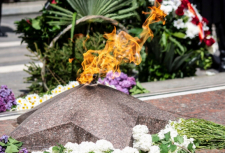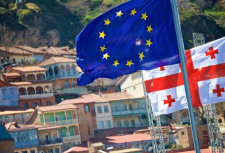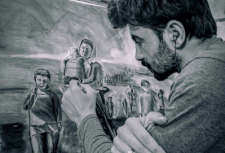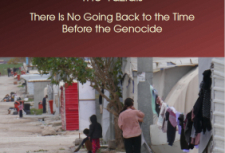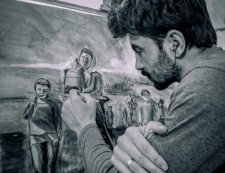Ezidi Family Reunites in Germany After Five Years of Separation
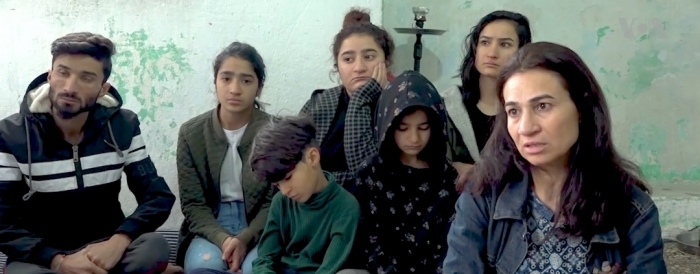
A Ezidi family from Iraq who survived the Islamic State (IS) massacre in Iraq in 2014 has finally reunited in Germany after five years of separation.
Naem Halef Yusuf, 46, a mother of seven, has been stranded with six of her children in Turkey since October 2014, following the IS capture of large swaths of land in Syria and Iraq. Her husband, Berekat Omar, and son Gazi are living in Germany. They had been unable to bring the family back together despite several efforts.
But five years of painful separation ended in December when Yusuf and her six children left Turkey for Germany through the German government’s family reunion visa.“It’s great to be a family. We are away from one another for five years. It is hard for kids, mom and dad. Now we will get together after five years. A family will reunite. This is great for my kids. They will go to school, be able to plan their future. Their lives will change. They will forget about what they had to go through,” Yusuf told VOA before departing for Germany.
Life in Iraq
Before the IS attack on her village, Girzerik, Yusuf was a stay-at-home mom who was taking care of her eight children. Her husband was a construction worker in a village on the outskirts of Sinjar, a province predominantly inhabited by the Ezidi religious minority group.
After Islamic State rampaged through Sinjar and its villages in August 2014, Yusuf and her family fled to Sinjar Mountain, where they dwelled for seven days in a temperatures up to 50 degrees Celsius and with almost no access to food or drinking water. Her 2-year-old child died under the scorching summer sun as a result of hunger and dehydration. Her husband was unable to walk because of an illness.
Like thousands of other Ezidis trapped on Mount Sinjar, Yusuf and her family thought their options were to die on the mountain or go down and be massacred by IS.
Ezidis are an ethnoreligious minority of about 550,000 people, mostly residing in northern Iraq with a substantial number in northern Syria. IS considered Ezidis “devil worshipers” whom they forced to convert to Islam or die. As such, the group destroyed their communities and killed thousands of their men while taking their women and children as sex slaves. Thousands remain missing.
The August 2014 Mount Sinjar siege created a humanitarian crisis, forcing the U.N. to declare a Level 3 emergency — the most severe classification of its kind. The trapped Ezidis were able to flee a weeklong siege to Syria after U.S.-backed Kurdish forces opened a safety route across the border.
Omar, still unable to walk, sent Yusuf and their children to Syria while he stayed in Iraq. At that point, the family’s paths diverged for five years, with Omar fleeing to Germany while Yusuf and the children ended up in Turkey. One of their sons, Ghazi, later moved from Turkey to Germany to join his father.
ezidi24.com
Tags:
Ezidi Family Reunites in Germany After Five Years of Separation

A Ezidi family from Iraq who survived the Islamic State (IS) massacre in Iraq in 2014 has finally reunited in Germany after five years of separation.
Naem Halef Yusuf, 46, a mother of seven, has been stranded with six of her children in Turkey since October 2014, following the IS capture of large swaths of land in Syria and Iraq. Her husband, Berekat Omar, and son Gazi are living in Germany. They had been unable to bring the family back together despite several efforts.
But five years of painful separation ended in December when Yusuf and her six children left Turkey for Germany through the German government’s family reunion visa.“It’s great to be a family. We are away from one another for five years. It is hard for kids, mom and dad. Now we will get together after five years. A family will reunite. This is great for my kids. They will go to school, be able to plan their future. Their lives will change. They will forget about what they had to go through,” Yusuf told VOA before departing for Germany.
Life in Iraq
Before the IS attack on her village, Girzerik, Yusuf was a stay-at-home mom who was taking care of her eight children. Her husband was a construction worker in a village on the outskirts of Sinjar, a province predominantly inhabited by the Ezidi religious minority group.
After Islamic State rampaged through Sinjar and its villages in August 2014, Yusuf and her family fled to Sinjar Mountain, where they dwelled for seven days in a temperatures up to 50 degrees Celsius and with almost no access to food or drinking water. Her 2-year-old child died under the scorching summer sun as a result of hunger and dehydration. Her husband was unable to walk because of an illness.
Like thousands of other Ezidis trapped on Mount Sinjar, Yusuf and her family thought their options were to die on the mountain or go down and be massacred by IS.
Ezidis are an ethnoreligious minority of about 550,000 people, mostly residing in northern Iraq with a substantial number in northern Syria. IS considered Ezidis “devil worshipers” whom they forced to convert to Islam or die. As such, the group destroyed their communities and killed thousands of their men while taking their women and children as sex slaves. Thousands remain missing.
The August 2014 Mount Sinjar siege created a humanitarian crisis, forcing the U.N. to declare a Level 3 emergency — the most severe classification of its kind. The trapped Ezidis were able to flee a weeklong siege to Syria after U.S.-backed Kurdish forces opened a safety route across the border.
Omar, still unable to walk, sent Yusuf and their children to Syria while he stayed in Iraq. At that point, the family’s paths diverged for five years, with Omar fleeing to Germany while Yusuf and the children ended up in Turkey. One of their sons, Ghazi, later moved from Turkey to Germany to join his father.
ezidi24.com
Tags:


